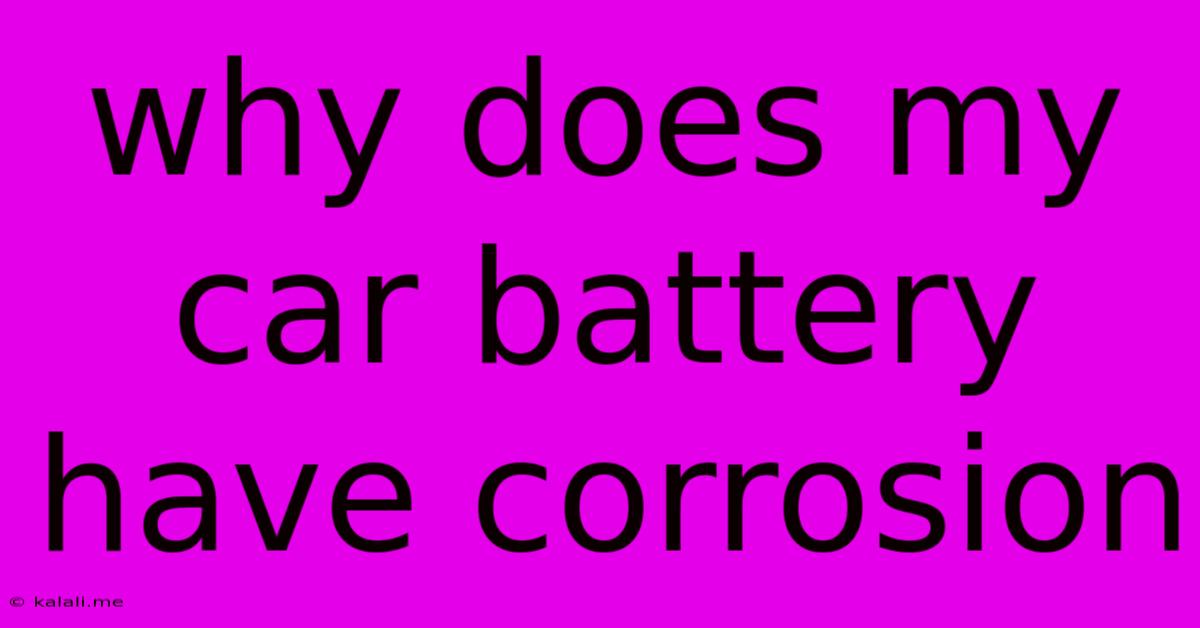Why Does My Car Battery Have Corrosion
Kalali
May 31, 2025 · 3 min read

Table of Contents
Why Does My Car Battery Have Corrosion? A Comprehensive Guide
Car battery corrosion is a common problem that can lead to starting issues and even battery failure. Understanding why this corrosion occurs is crucial for preventing it and keeping your car running smoothly. This article will delve into the causes, consequences, and effective solutions for battery corrosion.
What is Battery Corrosion?
Car battery corrosion is the buildup of a white, powdery, or sometimes green, crusty substance on the battery terminals and connectors. This substance is primarily a mixture of lead sulfate, lead oxide, and other chemicals formed through a chemical reaction involving the battery's electrolyte and atmospheric moisture. It acts as an insulator, preventing the proper flow of electricity and potentially damaging your battery.
Why Does Corrosion Occur?
Several factors contribute to car battery corrosion:
- Electrolyte Leakage: Battery acid (sulfuric acid) can leak from cracked or damaged battery cases or vents. When this acid mixes with atmospheric moisture, it creates a corrosive substance. This is especially common in older batteries or those subjected to rough handling.
- Overcharging: Overcharging the battery forces excessive current through the system, leading to increased chemical reactions and corrosion formation. A faulty alternator or voltage regulator can contribute to this problem.
- Moisture: Moisture in the air reacts with the battery's lead components, accelerating the corrosion process. This is more prevalent in humid climates or during periods of high humidity.
- Spills and Leaks: Spilled battery acid or electrolyte from other sources can contribute to corrosion.
- Dirt and Debris: Dirt, grime, and other debris can retain moisture and accelerate corrosion.
- Vibrations: Constant vibrations from driving can loosen battery terminals, creating gaps that allow moisture to seep in and accelerate corrosion.
Consequences of Battery Corrosion
Ignoring battery corrosion can have several negative consequences:
- Poor Starting: Corrosion inhibits the flow of electricity, making it difficult or impossible to start your car.
- Battery Failure: Severe corrosion can permanently damage your battery, leading to premature failure and requiring replacement.
- Electrical System Damage: The corrosion can spread to other electrical components, potentially damaging them as well.
- Safety Hazards: Battery acid is corrosive and can cause burns or skin irritation.
How to Prevent Battery Corrosion:
Prevention is key to avoiding battery corrosion. Here's how:
- Regular Cleaning: Clean your battery terminals and connectors regularly with a wire brush and baking soda solution (mix baking soda with water to create a paste). This removes existing corrosion and prevents further buildup.
- Apply Protective Coating: After cleaning, apply a thin layer of dielectric grease to the terminals and connectors. This grease prevents moisture and prevents future corrosion.
- Check Battery Level: Ensure your battery is properly charged and the electrolyte level is correct.
- Address Leaks: Repair or replace any damaged battery cases or vents immediately to prevent electrolyte leaks.
- Maintain Cleanliness: Keep the battery area clean and dry. Remove any dirt or debris that could retain moisture.
- Proper Ventilation: Ensure adequate ventilation around the battery to prevent moisture buildup.
- Regular Battery Testing: Have your battery and charging system tested regularly by a qualified mechanic.
Conclusion:
Car battery corrosion is a common but preventable problem. By understanding its causes and implementing the prevention strategies outlined above, you can significantly extend the life of your battery and avoid costly repairs or replacements. Regular maintenance and proactive cleaning are essential for keeping your car’s electrical system functioning optimally and safely.
Latest Posts
Latest Posts
-
How To Fix A Rip In Leather Sofa
Jun 01, 2025
-
What Is 100 Split 3 Ways
Jun 01, 2025
-
Reflexive And Transitive But Not Symmetric
Jun 01, 2025
-
How Often Should I Cut Bunnys Nail
Jun 01, 2025
-
What Is The Little Window In A Door Called
Jun 01, 2025
Related Post
Thank you for visiting our website which covers about Why Does My Car Battery Have Corrosion . We hope the information provided has been useful to you. Feel free to contact us if you have any questions or need further assistance. See you next time and don't miss to bookmark.